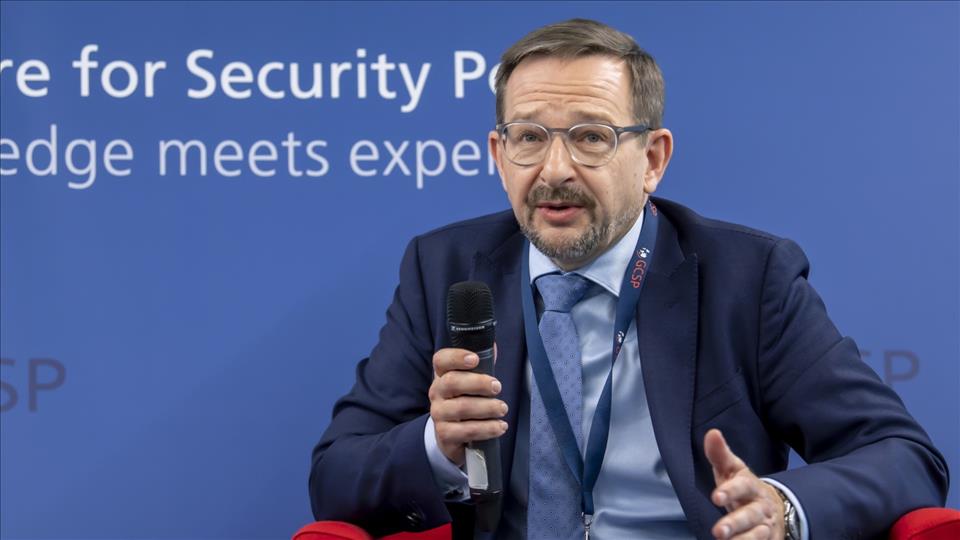
'The World Of Conflict Mediation Is Evolving'
Drawing from his decades-long experience in negotiations with millitant groups like Hamas, he discusses the challenges and opportunities in engaging with both state and non-state actors when it comes to peace talks. He argues Switzerland still has a role to play in international conflict resolution.
SWI swissinfo: As a Swiss diplomat, you were directly involved in negotiations with Hamas members in the early 2000s. Could you share how this experience shaped your understanding of the conflict in the Middle East and potential resolution strategies?
Thomas Greminger: At that time, Hamas, including its more moderate faction, showed interest in international recognition and engagement. They seemed open to a long-term ceasefire, recognising Israel, and working towards a two-state solution, which included ceasing rocket fire on Israel in exchange for improved conditions for the Palestinian population such as less harassment at checkpoints. Our strategic goal was to reinforce these moderates.
In conflict resolution, identifying groups that seek international recognition and wish to break out of isolation is crucial. Switzerland's strategy was to engage with these potentially constructive groups, to strengthen their influence over more radical elements. This approach was part of our broader dialogue with Islamic groups in the region.
SWI: In 2008, Switzerland drafted the Swiss document, a declaration of intent opening the way for talks between Israel and Hamas. How has Switzerland's role evolved from being a privileged partner negotiating with Hamas, to supporting the classification of the group as a terrorist organisation?
T.G.: That's an important question. Over time, the international community didn't address the fundamental grievances of the Palestinians and shifted their perception of Hamas. It increasingly saw Hamas as a terrorist group and radical elements in the movement progressively gained the upper hand. The Swiss dialogue with Hamas never fully ceased but transitioned from a political to a more technical nature after 2008, when key international actors like the European Union decided not to join the process.
SWI: The Federal Council aims to officially label Hamas as a terrorist organisation. Is Switzerland still engaging with Hamas?
T.G.: Following the brutal attacks in October and the atrocities committed by Hamas, which were clearly of a terrorist nature, the Federal Council had to send a strong signal by labelling them as terrorists. However, in Swiss legislation, there are different ways to label a group, and some methods would probably still allow for discreet, behind-the-scenes dialogue, if deemed useful at some point.
+'Declaring Hamas a terrorist organisation contradicts Switzerland's neutrality'
SWI: Could Switzerland play a role in moderating Israel's military response, given the recent calls by the international community for such action?
T.G.: As an advocate of international humanitarian law, Switzerland's role is to insist that Israel adheres to its principles, including the protection of civilians and in particular the principle of proportionality. This should be pursued through bilateral channels, multilateral platforms like the United Nations Security Council, and both quiet and public diplomacy.
SWI: South Africa has requested Israel be judged for genocide by the International Court of Justice. How do you assess Switzerland's current role protecting International Law and International Humanitarian Law, especially as the depository state of the Geneva Conventions?
T.G.: Switzerland has indeed become more outspoken in sending clear messages to Israel about respecting international humanitarian law. While the ICJ's legal action on the conflict is significant, it's unlikely to fundamentally solve the Palestinian issue. A political process and commitment from the parties on the ground, including Israel and major stakeholders like the United States and Europe, are essential for a sustainable political solution.
Legal Disclaimer:
MENAFN provides the
information “as is” without warranty of any kind. We do not accept
any responsibility or liability for the accuracy, content, images,
videos, licenses, completeness, legality, or reliability of the information
contained in this article. If you have any complaints or copyright
issues related to this article, kindly contact the provider above.

















Comments
No comment